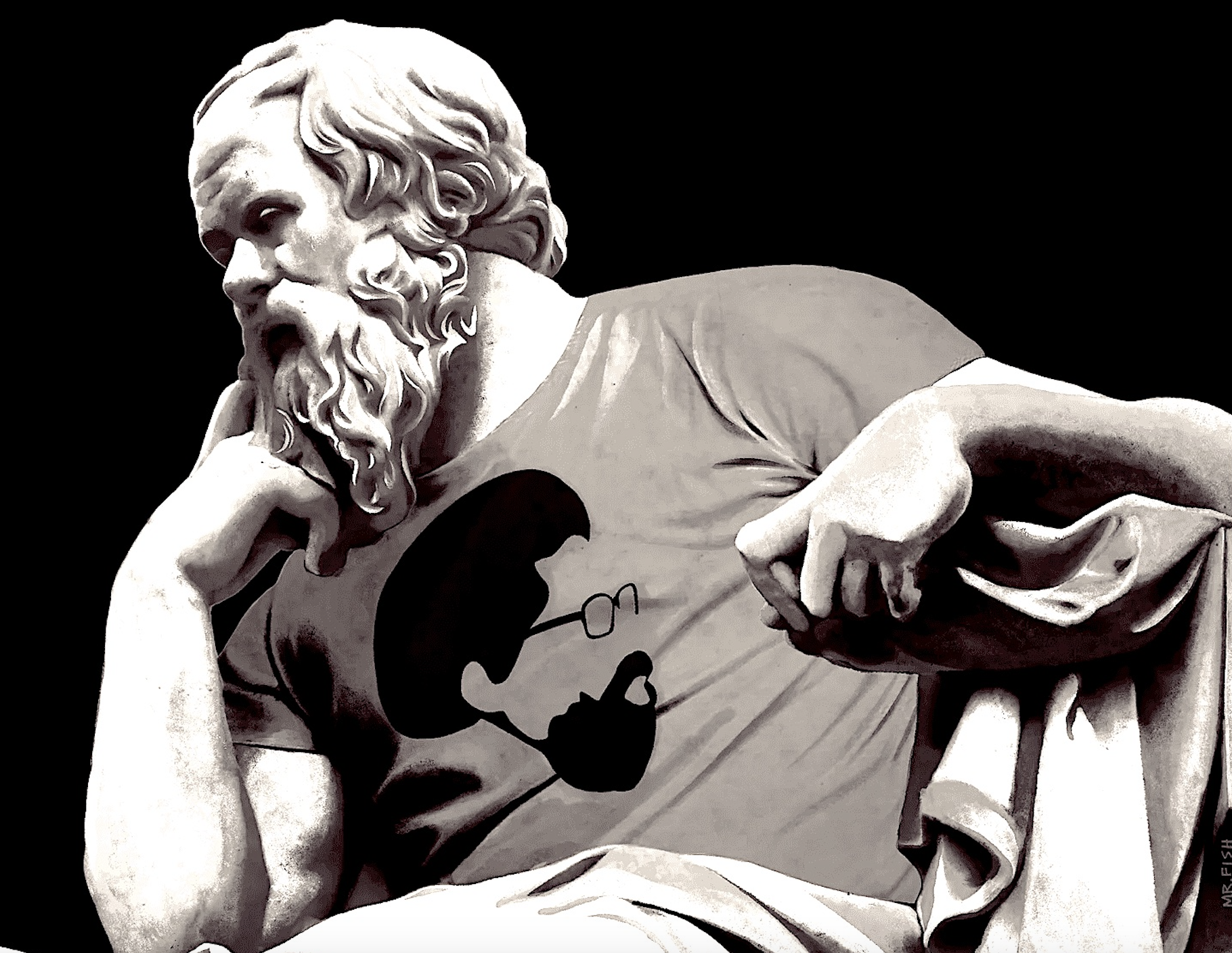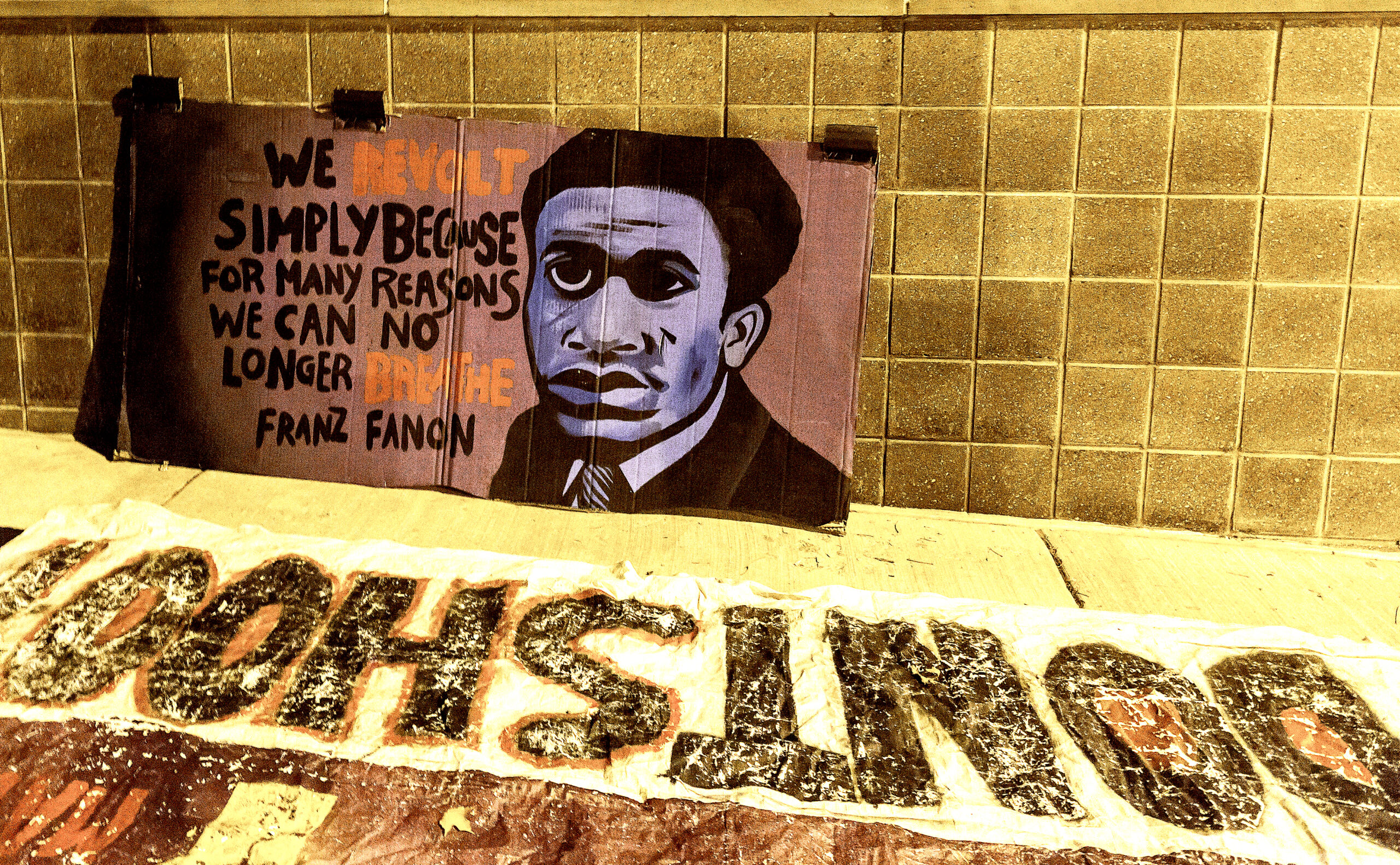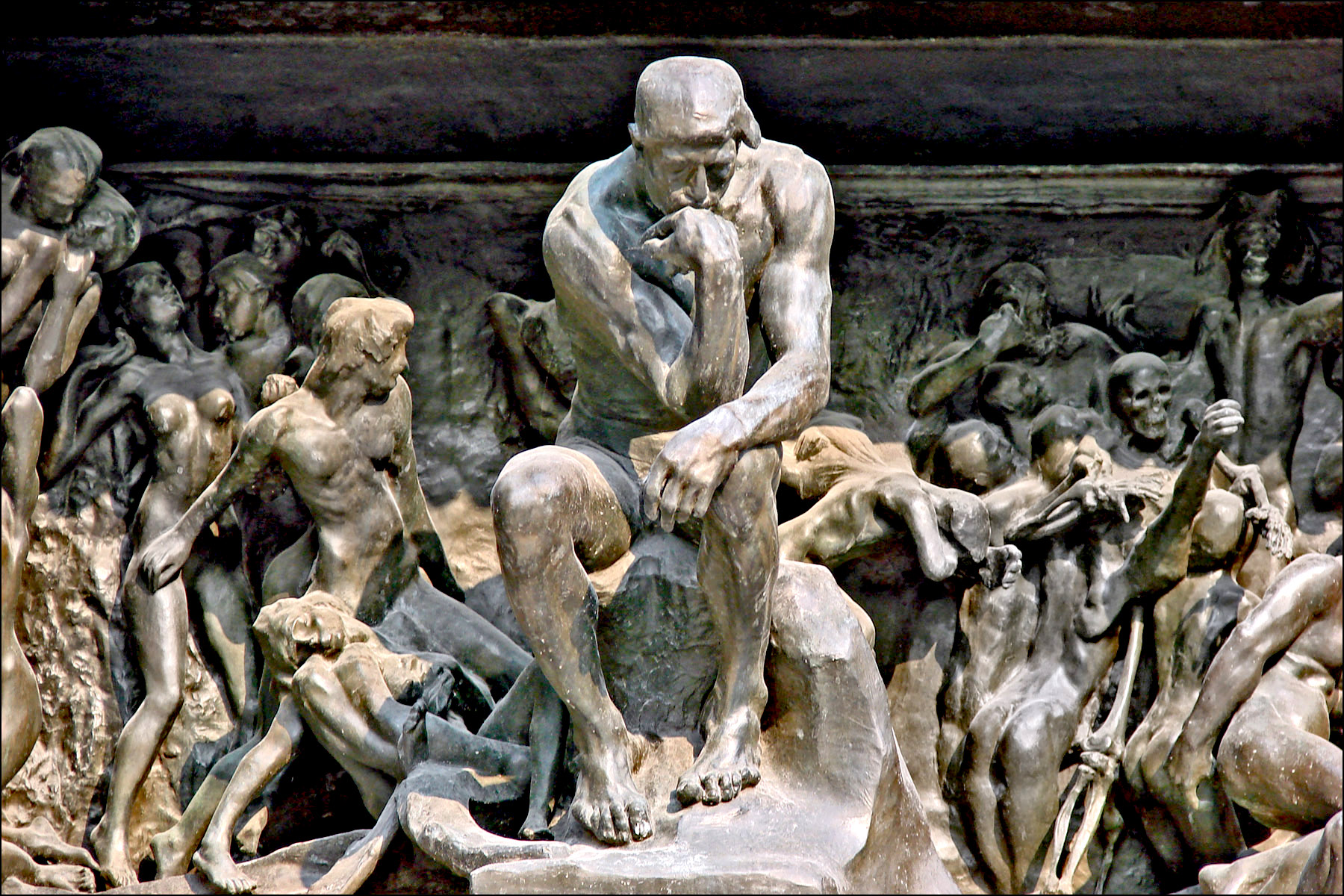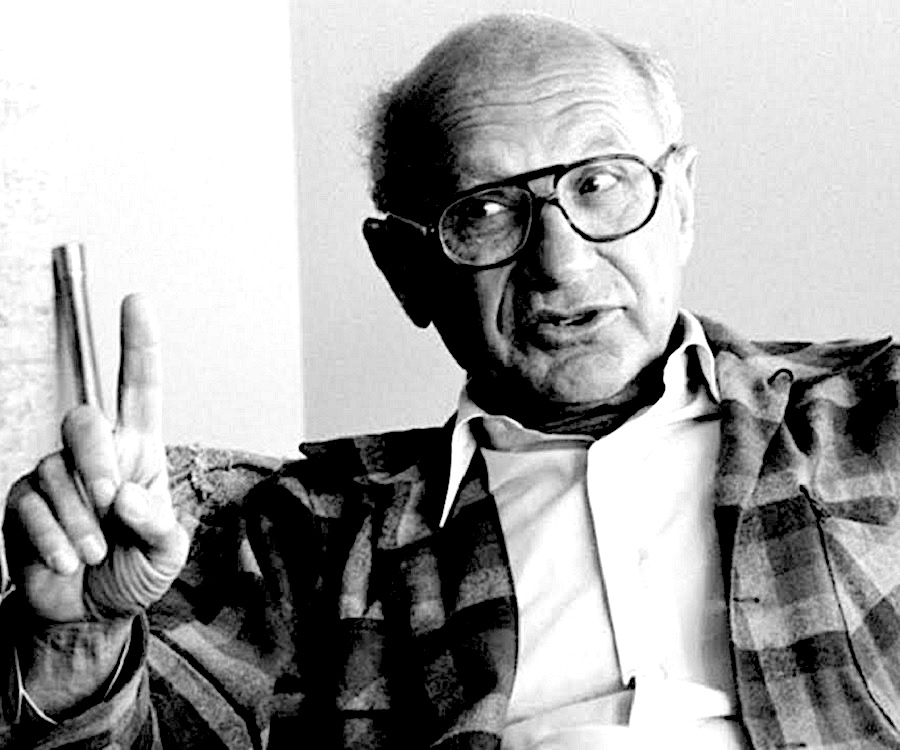The ruling classes always work to keep the powerless from understanding how power functions. This assault has been aided by a cultural left determined to banish “dead white male” philosophers.

The Enlightenment – by Mr. Fish.
By Chris Hedges
Original to ScheerPost
 I am standing in a classroom in a maximum security prison. It is the first class of the semester. I am facing 20 students. They have spent years, sometimes decades, incarcerated. They come from some of the poorest cities and communities in the country. Most of them are people of color.
I am standing in a classroom in a maximum security prison. It is the first class of the semester. I am facing 20 students. They have spent years, sometimes decades, incarcerated. They come from some of the poorest cities and communities in the country. Most of them are people of color.
During the next four months they will study political philosophers such as Plato, Aristotle, Thomas Hobbes, Niccolò Machiavelli, Friedrich Nietzsche, Karl Marx and John Locke, those often dismissed as anachronistic by the cultural left.
It is not that the criticisms leveled against these philosophers are incorrect. They were blinded by their prejudices, as we are blinded by our prejudices. They had a habit of elevating their own cultures above others. They often defended patriarchy, could be racist and in the case of Plato and Aristotle, endorsed a slave society.
What can these philosophers say to the issues we face — global corporate domination, the climate crisis, nuclear war and a digital universe where information, often manipulated and sometimes false, travels around the globe instantly? Are these thinkers antiquated relics? No one in medical school is reading 19th century medical texts. Psychoanalysis has moved beyond Sigmund Freud. Physicists have advanced from Isaac Newton’s law of motion to general relativity and quantum mechanics. Economists are no longer rooted in John Stuart Mill.
But the study of political philosophy, as well as ethics, is different. Not for the answers, but for the questions. The questions have not changed since Plato wrote The Republic. What is justice? Do all societies inevitably decay? Are we the authors of our lives? Or is our fate determined by forces beyond our control, a series of fortuitous or unfortunate accidents? How should power be distributed?
Is the good statesman, as Plato argued, a philosopher king — a thinly disguised version of Plato — who puts truth and learning above greed and lust and who understands reality? Or, as Aristotle believed, is the good statesman skilled in the exercise of power and endowed with thoughtful deliberation? What qualities are needed to wield power? Machiavelli says these include immorality, deception and violence. Hobbes writes that in war, violence and fraud become virtues.
What forces can be organized to pit the power of the demos, the populace, against the rulers, to ensure justice? What are our roles and duties as citizens? How should we educate the young? When is it permissible to break the law? How is tyranny prevented or overthrown? Can human nature, as the Jacobins and communists believed, be transformed? How do we protect our dignity and freedom? What is friendship? What constitutes virtue? What is evil? What is love? How do we define a good life? Is there a God? If God does not exist, should we abide by a moral code?
Building on Previous Philosophers

Banner quoting Franz Fanon: “We revolt simply because for many reasons we can no longer breathe”outside the Minneapolis Police Department fourth precinct following the officer-involved shooting of Jamar Clark on Nov. 15, 2015. (Tony Webster, Wikimedia Commons, CC BY 2.0)
These questions thunder down through the ages, asked during different times and under different circumstances. The most radical contemporary philosophers, including Frantz Fanon author of The Wretched of the Earth, built their edifices on the foundations of the political philosophers who came before them. In Fanon’s case it was Friedrich Hegel.
As Vladimir Lenin correctly said of Marx, most of his ideas could be traced to previous philosophers. Paulo Freire, the author of Pedagogy of the Oppressed, studied philosophy. Hannah Arendt, who wrote The Origins of Totalitarianism, was steeped in the ancient Greeks and Augustine.
“It is indeed difficult and even misleading to talk about politics and its innermost principles without drawing to some extent upon the experiences of Greek and Roman antiquity, and this for no other reason than that men have never, either before or after, thought so highly of political activity and bestowed so much dignity upon its realm,” Arendt writes in Between Past and Future.
Cornel West, one of our most important contemporary moral philosophers, who once admonished me for not having read the German philosopher Arthur Schopenhauer, is as conversant on Søren Kierkegaard, who he taught at Harvard, and Immanuel Kant as he is on W.E.B. DuBois, Fanon, Malcolm X and bell hooks.
The ancient philosophers were not oracles. Not many of us would want to inhabit Plato’s authoritarian republic, especially women, nor Hobbes’ “Leviathan,” a precursor to the totalitarian states that arose in the 20th century. Marx presciently anticipated the monolithic power of global capitalism but failed to see that, contrary to his utopian vision, it would crush socialism.
But to ignore these political philosophers, to dismiss them because of their failings rather than study them for their insights is to cut ourselves off from our intellectual roots. If we do not know where we came from, we cannot know where we are going.
If we cannot ask these fundamental questions, if we have not reflected on these concepts, if we do not understand human nature, we disempower ourselves. We become political illiterates blinded by historical amnesia. This is why the study of humanities is important. And it is why the closure of university classics and philosophy departments is an ominous sign of our encroaching cultural and intellectual death.
The Essence of Power

“The Thinker in The Gates of Hell” at the Musée Rodin. (Jean-Pierre Dalbéra, Wikimedia Commons, CC BY 2.0)
Political theory is not about political practice. It is about its meaning. It is about the essence of power, how it works and how it maintains itself. The most important activity in life, as Socrates and Plato remind us, is not action, but contemplation, echoing the wisdom enshrined in eastern philosophy. We cannot change the world if we cannot understand it. By digesting and critiquing the philosophers of the past, we become independent thinkers in the present. We are able to articulate our own values and beliefs, often in opposition to what these ancient philosophers advocated.
In my first class, I spoke about Aristotle’s distinction between the good citizen and the good person. The good person’s loyalty is not to the state. The good person “acts and lives virtuously and derives happiness from that virtue.” The good citizen, on the other hand, is defined by patriotism and obedience to the state. The good person, like Socrates or Martin Luther King, Jr. inevitably comes into conflict with the state when he or she sees the state turning away from the good. The good person is often condemned as subversive. The good person is rarely rewarded by or fêted by the state. These accolades are reserved for the good citizen, whose moral compass is circumscribed by the powerful.
The concept of the good citizen and the good person fascinated the class, for the state has been, since their childhood, a hostile force. The outside world does not view the incarcerated, and often the poor, as good citizens. They have been excluded from that club. As outcasts, they know the immorality and hypocrisy baked into the system. This makes vital the articulation of the questions these political philosophers pose.
Donate to CN’s Fall Fund Drive
Sheldon Wolin, our most important contemporary and radical political philosopher, who mentored a young Cornel West when he was Princeton University’s first Black candidate for a doctorate in philosophy, gave us the vocabulary and concepts to understand the tyranny of global corporate power, a system he called “inverted totalitarianism.”
As a professor at Berkeley, Wolin backed the Free Speech Movement. Wolin, while teaching at Princeton, was one of few professors who supported students occupying buildings to protest against South African apartheid. At one point, Wolin told me, the other professors in Princeton’s political science department refused to speak with him.
Wolin’s radical critique was grounded in these political philosophers, as he writes in his magisterial work, Politics and Vision, which my students are reading.
“The history of political thought,” Wolin writes, “is essentially a series of commentaries, sometimes favorable, often hostile, upon its beginnings.”
You can see a three hour interview I did with Wolin shortly before his death here.
Wolin argues that “an historical perspective is more effective than any other in exposing the nature of our present predicaments; if not the source of political wisdom, it is at least the precondition.”
Neoliberalism as economic theory, he writes, is an absurdity. None of its vaunted promises are even remotely possible. Concentrating wealth in the hands of a global oligarchic elite — 1.2 percent of the world’s population holds 47.8 percent of global household wealth — while demolishing government controls and regulations, creates massive income inequality and monopoly power. It fuels political extremism and destroys democracy. But economic rationality is not the point. The point of neoliberalism is to provide ideological cover to increase the wealth and political control of the ruling oligarchs.
This is a point Marx famously makes when he writes in his Theses on Feuerbach:
“The ideas of the ruling class are in every epoch the ruling ideas, i.e. the class which is the ruling material force of society, is at the same time its ruling intellectual force. The class which has the means of material production at its disposal, has control at the same time over the means of mental production, so that thereby, generally speaking, the ideas of those who lack the means of mental production are subject to it. The ruling ideas are nothing more than the ideal expression of the dominant material relationships, the dominant material relationships grasped as ideas.”
The Ruling Ideology of Neoliberalism

Milton Freidman in 2012. (Famous People/Reason video blog, Wikimedia Commons, CC BY-SA 4.0)
As a ruling ideology, neoliberalism was a brilliant success. Starting in the 1970s, its Keynesian mainstream critics were pushed out of academia, state institutions and financial organizations such as the International Monetary Fund (IMF) and World Bank and shut out of the media.
Wolin, once a regular contributor to publications such as The New York Review of Books, found that because of his animus towards neoliberalism, he had difficulty publishing. Intellectual poseurs such as Milton Friedman were given prominent platforms and lavish corporate funding. They disseminated the official mantra of fringe, discredited economic theories popularized by Friedrich Hayek and the third-rate writer, Ayn Rand.
Once we knelt before the dictates of the marketplace and lifted government regulations, slashed taxes for the rich, permitted the flow of money across borders, destroyed unions and signed trade deals that sent jobs to sweatshops in Mexico and China, the world would be a happier, freer and wealthier place. It was a con. But it worked.
Ideas, however esoteric they may appear to the public, matter. These ideas shape a society, even if most in the society are unfamiliar with the nuances and details of these theories.
“The ideas of economists and political philosophers, both when they are right and when they are wrong, are more powerful than is commonly understood,” writes the economist John Maynard Keynes. “Indeed the world is ruled by little else. Practical men, who believe themselves to be quite exempt from any intellectual influences, are usually the slaves of some defunct economist. Madmen in authority, who hear voices in the air, are distilling their frenzy from some academic scribbler of a few years back.”
Most of the great works of political philosophy have been written during a period of crisis. The breakdown of society, war, revolution and institutional and economic collapse, obliterate established belief systems and render hollow the clichés and slogans used to justify them. These instabilities and vicissitudes bring forth new ideas, new concepts, new answers to the old questions. Political thought, as Wolin writes, “is not so much a tradition of discovery as one of meaning extended over time.”
The answers to the core questions asked by political philosophers differ depending on the circumstances. The answers in my prison classroom will not be the same as those in a classroom of an elite university where students come from, and seek to become part of, the ruling class.
My students are responding to very different phenomena. Their responses come out of the injustices and suffering they and their families endure. They are acutely aware of the perfidy of the ruling class. White supremacy, deindustrialization, the collapse of the justice system, the internal armies of occupation that terrorize their communities and poverty are not abstractions. The solutions they embrace will inevitably be subversive.
The ruling class, like ruling classes throughout history, seek to keep the poor and oppressed uneducated for a reason. They do not want those cast aside by society to be given the language, concepts and intellectual tools to fight back.
Chris Hedges is a Pulitzer Prize–winning journalist who was a foreign correspondent for 15 years for The New York Times, where he served as the Middle East bureau chief and Balkan bureau chief for the paper. He previously worked overseas for The Dallas Morning News, The Christian Science Monitor and NPR. He is the host of show “The Chris Hedges Report.”
Author’s Note to Readers: There is now no way left for me to continue to write a weekly column for ScheerPost and produce my weekly television show without your help. The walls are closing in, with startling rapidity, on independent journalism, with the elites, including the Democratic Party elites, clamoring for more and more censorship. Bob Scheer, who runs ScheerPost on a shoestring budget, and I will not waiver in our commitment to independent and honest journalism, and we will never put ScheerPost behind a paywall, charge a subscription for it, sell your data or accept advertising. Please, if you can, sign up at chrishedges.substack.com so I can continue to post my Monday column on ScheerPost and produce my weekly television show, “The Chris Hedges Report.”
This column is from Scheerpost, for which Chris Hedges writes a regular column. Click here to sign up for email alerts.
The views expressed are solely those of the author and may or may not reflect those of Consortium News.
Donate to CN’s
Fall Fund Drive



Interesting that he brings up Dr. Cornel West. I had been looking with great interest at his presidential bid, but have been very disappointed so far. He refuses to bring up class issues and seems to be going full identity politics. He also seems very adverse, as does Hedges, to bring up the covid totalitarianism; which for me is a hard pass as far as voting goes.
Has Hedges ever mentioned the pandemic response in the context of totalitarianism?
I follow your writing with interest. We overlapped at the Morning News, where I remained until 2001.
Your work with prisoners couldn’t be more important
for human value and such an immediate and concrete
example of “Religion that is pure and undefiled before God . . .”
(Jas.1.27).
Cornel West’s “admonition” to read Schopenhaur’s
The World as Will and Idea, because it prepares the West for
Nietzsche’s criticism of fake Christianity. You might also include
The American Trap by Frederic Pierucci, a detailed death of five
years also in a maximum-security prison for fake justice.
“The ruling class, like ruling classes throughout history, seek to keep the poor and oppressed uneducated for a reason. They do not want those cast aside by society to be given the language, concepts and intellectual tools to fight back.”
Yes, that is why the policy of the neoliberal leftist Democrat Party has ensured that the poor, especially inner city Blacks, remain prisoners of the government plantation. While claiming to be the saviors of the downtrodden, they have done little to nothing to improve their living standards or improve their education, but have usually done just the opposite For example, forced busing in the 70s wasted $billions which enriched GM (by providing the buses) and Big Oil (by providing the diesel fuel- all that additional CO2 in our air- tsk, tsk). Those $billions could have been used to build new, air-conditioned, state-of-the-art schools (including charter schools) in the inner cities, for higher pay to attract the best teachers, educational extra-curricular activities, etc to ensure that these poor students got the best education they deserved.
Instead, their valuable time was wasted riding on hot and unsafe school buses, breathing toxic traffic fumes, while the public school system was damaged to the point where now average American students (Black and White) fall below international standards. But, in particular, a majority of inner city students read far below their age level and the Left calls math “racist” because Blacks have such difficulty with it!
But the actual racism comes from these sinister Democrat (and their globalist elite puppet-masters’) policies, which have created such disparity. Educational disparity leads to economic disparity. And thus, the power elites have fulfilled their agenda as stated in the article:
“The ruling class, like ruling classes throughout history, seek to keep the poor and oppressed uneducated for a reason. They do not want those cast aside by society to be given the language, concepts and intellectual tools to fight back.”
Unfortunately, many well-meaning but naive liberals continue to believe the Democrat Party lies and end up supporting this evil agenda.
Watching and listening to Milton Friedman speak he comes across like the stereotypical glib, fast talking used car salesman. See this youtube video by Sam Seder which includes a two minute clip of Milton Friedman being interviewed by Phil Donahue.
The clip shows what a “thoughtful outcome-based libertarian” sounds like. Friedman is called the “smug little man who advised Augusto Pinochet and his dictatorship”.
hxxps://www.youtube.com/watch?v=ulPxqpEigxM
Milton Friedman employs what is known as the Gish gallop. He is very shifty and does not at all seem like the kind of person one would want to trust.
Congratulations to the class !
This is peculiar: “Not many of us would want to inhabit Plato’s authoritarian republic, especially women” – because Plato was the only Greek I know of who did the unthinkable – argued that what mattered was capacity and ability, and that could be found in both sexes, so let it be found! See Julian Annas, ‘Plato’s ‘Republic’ and Feminism, Philosophy, (July 1976): hxxps://www.jstor.org/stable/3749607
I loved this. I was particularly pleased to see Milton Friedman called a poseur and Ayn Rand called third rate. That’s actually being generous to both of them. Friedman’s books are so incredibly vapid, he just repeats ad nauseum that anything good in the world comes from businesses and everything bad comes from everywhere else. For that he gets a Nobel Prize? I mean really.
As for Any Rand, you don’t have to read too far into what she writes to see that she’s has a very low level of intelligence. For example in An Introduction to Objectivist Epistemology she claims that math is the “science of measurement” and therefore there’s no such thing as negative numbers. The argument is something like “show me negative three bicycles, you can’t.” She goes on to conclude that the use of negative numbers constitutes a communist conspiracy and ultimately leads to the end of the world as we know it.
First off math is not a science, second off saying it’s just about measurement is like saying Hamlet is about grammar and punctuation. And third off, saying there’s no such thing as a negative number betrays ignorance beyond comprehension.
I call her method of reasoning “proof by arrogance”. The world is so full of dopes who read that nonsense and get thoroughly enamored by the arrogance of it. Anybody that arrogant must be right? I’ve lost friends down that black hole. It’s depressing that people are that gullible and can’t think for themselves. The emperor truly wears no clothes.
I feel that pain. I remember during the early 2010s’, with that ponce Paul Ryan going around praising Rand’s books, saying how he obligated her staff to read her books- thinking, “Oh great. That sure doesn’t bode well.” That tool helped introduce a new generation to her so-called philosophy, and many younger men bought into it. Basically hers was a faux-intellectual rationalization for greed and shallow thinking. I had a boss who loved her “Atlas Shrugged” and wouldn’t stop raving about it. 10 years on, this tripe has been debunked, yet again, but there are still a lot of faithful adherents.
Not only does the ruling class not want the poor in this country to be able to fight back, they don’t want the countries we regime change or try to to be able to fight back. They don’t believe in the right to self defense. They harken back to the barbarians of antiquity. It’s time for them to exit the world stage.
Wonderful. I’ll be rereading this.
Meanwhile, another name and another stream of thought to enter into this is that of the late Elinor Ostrom, who spent a rough half-century empirically documenting successful and unsuccessful management of commons resources.
Her prose is fairly dense and academic and its attention very often goes to the local case, which apparently makes it easy to overlook its range of applicability and its value. But that’s what politics amounts to, almost completely: the communications and behaviors and customs by which we manage common pool resources.
These are, in reality, all we have. I call the house I live in _mine_, but ownership is not a characteristic of the house nor of its resident, but only of an “agreement” among humans–and one about which, as usual, we do not altogether agree. All our resources are held in common, ultimately: the planet will regenerate, or we will go down together.
And the good news is that in a properly designed system, venal and jealous and petty and sinful or greedy humans–whatever you want to call our species–actually can govern and use common resources, even while official governments rise and fall around us. Of course, failure happens too, and more frequently these last centuries.
I won’t attempt to do her life work justice here and now, but if you wonder about these questions that “thunder down through the ages,” her work supplies quite a base of answers.
Some of the best things I’ve ever read are by white men:
History of Western Philosophy — B. Russell
United States, Essays ’52-’92 — Gore Vidal
Power and the Powerless — Michael Parenti
Portrait of a Lady — Henry James
Lolita — Vladimir Nabakov
All the King’s Men — Robert Penn Warren
Confessions of Nat Turner — William Styron
Michael Parenti – excellent!
He’s magnificent.
Fine selection, Drew! On Michael Parenti, his book “The Assassination of Julius Caesar” A People’s History Of Ancient Rome is mostly about the Roman people and much less about Caesar. Dr. Parenti describes in well-research archives how the wealthy oligarchic ruling-class looked down on the common people, which is how they view us today. The old adage of: “The more things change, the more they….you know the rest.
Money and Power control the world since time immemorial, and will continue until the people rise up and defeat them, as there are more of us then there are of them, and then build an egalitarian society which sounds utopian, but not if the collective spirit of the people unite for the common good. Unfortunately too many people are apathetic and are the “good citizen” types which Chris Hedges described.
And that mug shot of Mr. Greed! On the way to work one morning I was listening to the news. At work, I told the girl in the office, “The anti-Christ passed away.” She said, “Which one?” I said, “Milton Freeman.”
Excellent article, Mr. Hedges!
Great comments Mr. Lambert.
I’m quite familiar with Parenti’s “The Assassination of Julius Caesar”. An incisive and illuminating book beyond measure.
Whoops. Forgot to add two stunning pieces of literature by the phenomenal Truman Capote:
“Breakfast at Tiffany’s” and “In Cold Blood”
You write “Marx presciently anticipated the monolithic power of global capitalism but failed to see that, contrary to his utopian vision, it would crush socialism.”
That is false. Socialism lives today in the International Committee of the Fourth International and the Socialist Equality Party, a party that I have supported for more than a quarter of a century. One of the reasons that I have less confidence in your writings as time goes by is that you don’t support socialism and you believe in god. Two strikes against you, Chris.
It’s hard to be a socialist in 2023 USA, it always was, I think. The “free-market” zealots have such a lock on almost every aspect of our society, it’s difficult for even the most die-hard acolytes like myself to believe we’ll ever make the transition, even if our lives depend on it. I often try and explain to friends, family, co-workers how socialistic policies and practices are the only way we can save our species, but most have wholly digested the anti-socialist, red-baiting propaganda that has been drilled into our populace for the last century. People see any suggestion of collectivist action as a threat to their freedom, even though it’s quite the opposite. It’s discouraging.
I agree with the “god” bit Carolyn.
To be simplistic: Marx believed capitalism would transform into socialism. That hasn’t happened yet. It’s either socialism or barbarism.
Marx was too optimistic industrial capitalism has turned into techno-feudal finance capitalism: the power of rentier, finance capital is running the show at the moment, however US dollar hegemony will not last and what we now know as capitalism will either destroy us all or a form of socialism will emerge. Regardless, capitalism’s days are numbered. (Marx referred to finance capital as “fictitious capital”) Also, Marx is not the only source for socialist thought.
Still, I believe Hedges is a socialist, just not the flavor everyone likes. I don’t care if he believes in the Spaghetti Monster, he does good work and practices what he preaches – working in a prison for one. We need all the allies we can get.
Maybe Marx was right. The USA has possibly more of the attributes of socialism today than it does of capitalism.
Sorry, that’s a joke right?
Let’s hope Jonny.
There are NO solutions to be found within electoral politics. Under global capitalism, the present trajectories will continue—-> worse inequality, more extreme weather/climate chaos, imperialistic wars. …….. The entire world economy needs to be reorganized around the interests of society/environment instead of private profit. ALL the world’s resources, including all scientific knowledge, needs to be harnessed for the benefit of all the world’s people. ———- it is only the revolutionary unity of the international working class that can bring about these fundamental changes that’d lead to a planned global economy based on socialism.
So many pseudo-left organizations pose as ‘alternatives’ to our duopoly, like the DSA, which is merely a faction of the Dem Party. The Socialist Equality Party is the only political party working to unify/educate the international working class. —– they’ve help establish the International Workers’ Alliance of Rank-and-File Committees. …..uniting workers at the shop floor level. ….bypassing the corrupt bureaucratic union apparatus, which collude with gov’t to stifle class struggle.
———– Reading how issues/events are reported at wsws.org is an ongoing education as o how the world works.
Good points, shmutzoid! I haven’t looked at wsws.org for quite a few years. So many things to read. I highly recommend Professor of Economics, Michael Chossudovsky’s book, “The Globalization of Poverty and the New World Order”, published in 2003, but it could have been written this morning as it isn’t dated, and contains a wealth of info on the subject.
Brilliant. As usual. Thank you.
Well, yes and know. But time is quickly running out for both as now born artificial intelligence quickly matures but, unfortunately and despite its expanding death grip on Sapiens, will not likely advance much beyond the beliefs of its parents and educators who are we (as in wee).